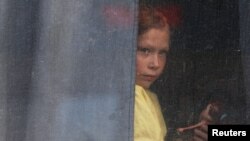In Kherson, residents were without lights and water Sunday as the city’s Russian-installed officials accused Ukraine of “sabotage” without evidence.
The Kremlin-installed administration in Kherson said an airstrike — the “result of an attack organized” by Ukraine — damaged “three concrete poles of high-voltage power lines.”
The authorities said energy specialists were working to “quickly” resolve the issue, according to Agence France-Presse.
However, Yaroslav Yanushevych, the head of the Kherson regional administration, blamed Russia for the power outages.
Yanushevych wrote on Telegram: “In temporarily occupied Beryslav, Russian troops blew up high-voltage power lines. About one and a half kilometers of utility poles and lines were destroyed.”
The “damage is quite extensive,” he added, according to AFP.
Ukraine President Volodymyr Zelenskyy and other officials have said in the past month that between 30% and 40% of Ukraine’s energy infrastructure has been destroyed by Russian airstrikes.
He said in his nightly video address Sunday, “As of this evening, stabilization blackouts continue in Kyiv and six regions. More than 4.5 million consumers are without electricity. Most of them are now in Kyiv and the Kyiv region. It’s really difficult.”
Residents told to prepare for worst
In Kyiv, Mayor Vitali Klitschko warned the city’s residents Sunday that they must prepare for the worst this winter — such as having no electricity, water or heat in the freezing cold — if Russia keeps striking the country's energy infrastructure.
“We are doing everything to avoid this. But let’s be frank, our enemies are doing everything for the city to be without heat, without electricity, without water supply, in general, so we all die. And the future of the country and the future of each of us depends on how prepared we are for different situations," Klitschko told state media.
The United Nations Climate Change Conference, commonly referred to as COP27, opened in Egypt Sunday with the summit being overshadowed by Russia’s war in Ukraine.
U.K. representative Alok Sharma, who was the president of COP26, said at the ceremonial opening speech at COP27: “(Russian President Vladimir) Putin’s brutal and illegal war in Ukraine has precipitated multiple global crisis, energy and food insecurity, inflationary pressures and spiraling debt.
“These crises have compounded existing climate vulnerabilities and the scarring effects of the pandemic,” Sharma added.
Sameh Shoukry, incoming COP27 president and Egyptian foreign minister, expressed concern Sunday that crises related to Russia's invasion of Ukraine should not overshadow action on climate change.
Ukrainians cautious in Kherson
In Kherson, Russia is increasing its evacuation of residents from the conflict zone and acknowledging the deteriorating situation in the region. At least 70,000 civilians have been moved from Kherson, which fell to Russian forces within days of the start of the conflict in February.
While a bloody battle for the city is predicted, the "situation in Kherson is clear as mud," Michael Kofman, the director of Russian studies at CNA, a research institute in Arlington, Virginia, wrote in an analysis this week, The New York Times reported. "Russian forces seemed to withdraw from some parts, evacuated and drew down, but also reinforced with mobilized personnel."
Residents of the city report abandoned checkpoints and no more Russian patrols, but Ukrainian officials are cautious, believing Moscow is setting a trap.
Meanwhile, Zelenskyy said, in reference to the Iranian regime, that everyone who helps Russia prolong this war must bear responsibility for the consequences of this war.
“If it was not for the Iranian supply of weapons to the aggressor, we would be closer to peace now. And this means closer to a complete solution to the food crisis. Closer to solving the cost-of-living crisis. Closer to stabilization at the energy market. Closer to reliable security against radiation blackmail, which Russia does not give up,” Zelenskyy said.
Iranian Foreign Minister Hossein Amir Abdollahian admitted for the first time Saturday that Iran sent drones to Russia, but he said that was before the war.
In his Sunday night video address, Zelenskyy dismissed Iran’s admission of providing only a limited number of drones to Russia. He said Ukrainian forces are downing unmanned aerial vehicles daily.
The United States and its Western allies on the U.N. Security Council have called on Secretary-General Antonio Guterres to investigate whether Russia has used Iranian drones to attack civilians in Ukraine.
Also Sunday, Britain’s defense ministry said in its daily intelligence report about Ukraine that there has been a “series of dismissals of senior Russian military commanders since the onset of the invasion in February 2022.”
The report said, “These dismissals represent a pattern of blame against senior Russian military commanders for failures to achieve Russian objectives on the battlefield. This is in part likely an attempt to insulate and deflect blame from Russian senior leadership at home.”
In its intelligence update Saturday, however, the British defense ministry said “Russia is probably struggling to provide military training for its current mobilization drive and its annual autumn conscription intake. The Russian Armed Forces were already stretched providing training for the approximate 300,000 troops required for its partial mobilization, announced in September.
“These issues,” the ministry said, “will be compounded by the additional regular autumn annual conscription cycle” that begins in November for about 120,000 conscripts.
Russia has resorted to training troops in Belarus, the ministry said, “due to a shortage of training staff, munitions and facilities in Russia.” The intelligence update said that “deploying forces with little or no training provides little additional offensive combat capability.”
Some information for this report came from The Associated Press, Reuters and Agence France-Presse.








